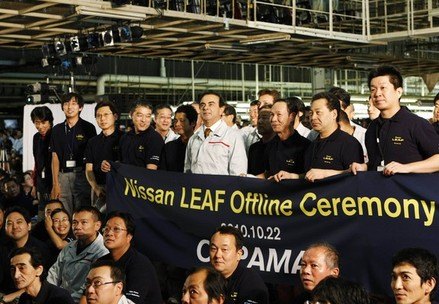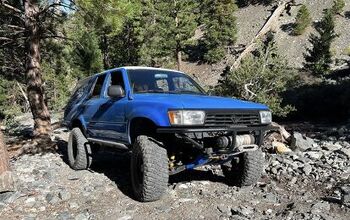Nissan Bets The Farm On A Leaf

Unimpressed by BYD’s aborting of the pure plug-in EV, Nissan is betting the farm on us plugging in instead of gassing up. A few days ago, Nissan officially introduced the Leaf, the world’s first mass-produced EV in the standard passenger class, seating five. It won’t totally replace the internal combustion engine, at least not at the plant where it is made.
When the Leaf went “offline” a few days ago (this is one of the many quirks in the industry: offline good, online bad), reporters had a chance to marvel at the engineering. The Nikkei [sub] reports that “Leaf assembly was taking place on the same line as Nissan’s popular Juke mini-SUV and other compacts. At the station where gasoline-powered cars receive their fuel tanks, the Leaf gets its lithium-ion battery pack, and at the engine-mounting station it receives its electric motor.” At the Nissan’s Oppama plant in Yokosuka, Kanagawa Prefecture, Leafs and other cars share the same line, all they needed was a special lift for the battery packs, which weigh several hundred kilograms.
Nissan has big plans for the Leaf. Using the Oppama principle to build various models on the same line simultaneously, Nissan will start mass-producing the Leaf at its Smyrna Plant in the U.S. in late 2012 and at its Sunderland Plant in the U.K. in early 2013. Once that is all in motion, Nissan will have an annual capacity of 250,000 EVs worldwide.
The also will produce lots of batteries, and they hope to “gradually compress the cost of mass-producing batteries by having both Nissan and Renault produce EVs,” said Corporate Vice President Hideaki Watanabe.
Nissan’s dream? To become for EVs what Toyota became for hybrids. “Today, hybrid technology is almost synonymous with Toyota,” says the Nikkei. Ghosn says the Prius has been more significant to Toyota as a brand-booster than as a contributor to sales, and he hopes the Leaf will similarly electrify the perception of Nissan.
Likewise, should the Leaf turn into compost, it could bring Nissan down. Betting the farm is risky. You could end up with two farms. Or as a homeless.

Bertel Schmitt comes back to journalism after taking a 35 year break in advertising and marketing. He ran and owned advertising agencies in Duesseldorf, Germany, and New York City. Volkswagen A.G. was Bertel's most important corporate account. Schmitt's advertising and marketing career touched many corners of the industry with a special focus on automotive products and services. Since 2004, he lives in Japan and China with his wife <a href="http://www.tomokoandbertel.com"> Tomoko </a>. Bertel Schmitt is a founding board member of the <a href="http://www.offshoresuperseries.com"> Offshore Super Series </a>, an American offshore powerboat racing organization. He is co-owner of the racing team Typhoon.
More by Bertel Schmitt
Latest Car Reviews
Read moreLatest Product Reviews
Read moreRecent Comments
- Formula m For the gas versions I like the Honda CRV. Haven’t driven the hybrids yet.
- SCE to AUX All that lift makes for an easy rollover of your $70k truck.
- SCE to AUX My son cross-shopped the RAV4 and Model Y, then bought the Y. To their surprise, they hated the RAV4.
- SCE to AUX I'm already driving the cheap EV (19 Ioniq EV).$30k MSRP in late 2018, $23k after subsidy at lease (no tax hassle)$549/year insurance$40 in electricity to drive 1000 miles/month66k miles, no range lossAffordable 16" tiresVirtually no maintenance expensesHyundai (for example) has dramatically cut prices on their EVs, so you can get a 361-mile Ioniq 6 in the high 30s right now.But ask me if I'd go to the Subaru brand if one was affordable, and the answer is no.
- David Murilee Martin, These Toyota Vans were absolute garbage. As the labor even basic service cost 400% as much as servicing a VW Vanagon or American minivan. A skilled Toyota tech would take about 2.5 hours just to change the air cleaner. Also they also broke often, as they overheated and warped the engine and boiled the automatic transmission...



































Comments
Join the conversation
" At the Nissan’s Oppama plant in Yokosuka, Kanagawa Prefecture, Leafs and other cars share the same line, all they needed was a special lift for the battery packs, which weigh several hundred kilograms."
This isn't a bet the farm operation at all. Betting the farm is when you go all in for a proposition. Nissan is indeed making a significant investment in electric cars, but the very fact that they are building the Leaf in a flex-factory mixed in with other products shows that Nissan is not betting the farm.
What fraction of Nissan's capital budget is being spent on electric car specific equipment? I doubt it is over 10%.
The public perception of the Prius name is of a new look alternative propelled car which will hold even for an all electric Prius. While autophiles make the distinction between hybrid vs all electric, the Prius name is more like Apple in that the design can change and improve but its alterna cred persists.